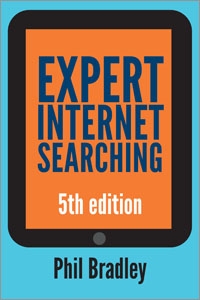
Primary tabs
You don't need to be an ALA Member to purchase from the ALA Store, but you'll be asked to create an online account/profile during the checkout to proceed. This Web Account is for both Members and non-Members.
If you are Tax-Exempt, please verify that your account is currently set up as exempt before placing your order, as our new fulfillment center will need current documentation. Learn how to verify here.
- Description
- Table of Contents
- About the author
In an environment where increasing amounts of information (and fake news) flood the internet on websites and social media, the information professional’s job is getting harder. It is important that they are skilled at finding and using the appropriate information and assisting users in working out what information they need and the best way of getting it. Expert Internet Searching provides library and information professionals with in-depth practical information on how to search the internet quickly and effectively to help their users and make their lives easier.
Now fully revised for its fifth edition, this book covers the basics of search before going into detail on how to run advanced and complex searches using a variety of different search engines. This edition has been updated to include current trends in search, such as social media search, fake news, and discussion of the authority and validity of search results. It will ensure that information professionals, whether complete beginners or more experienced, are able to work efficiently to obtain accurate information in a timely fashion. Key topics covered include:
- an introduction to the internet and search engines;
- the Google experience and a discussion of its disadvantages;
- directory, clustering and similarity search engines;
- visual and image search engines;
- specialized search engines incorporating academic search and services for children;
- academic and other specialized search engines;
- news-based search engines including traditional media resources and a discussion of fake news;
- social media search engines; and
- hints and tips on better searching.
This book will be useful reading for any information professional who is seeking to gain an in-depth understanding of the search process and the search industry. It provides a vital guide to the basics in search, but will also help experienced professionals stay up to date with the latest trends and information in the industry.
1. An introduction to the internet
- Introduction
- An overview of the internet
- What the internet is and is not
- Search engines
- Failing resources
- The information mix
- Summary
2. An introduction to search engines
- Introduction
- Search engine criteria
- Free-text search engines
- Data collection
- Relevance ranking
- Index- or directory-based search engines
- Multi- and meta-search engines
- Visual search engines
- Hidden, invisible, deep and dark web search engines
- Multimedia search engines
- Social media search engines
- Other search engines
- Summary
3. The world according to Google
- Introduction
- The Google experience
- Google search: the basics
- Boolean operators
- Phrase searching
- Narrowing your search results
- Suggestions and searches related to
- Advanced search functionality
- Other search functions
- ‘One-trick ponies’
- The knowledge graph and carousel
- URL modifiers
- Putting it all together
- Other Google search tools
- The disadvantages of Google
- Summary
4. Other free-text search engines
- Introduction
- Bing
- DuckDuckGo
- Yandex
- Other free-text search engines
- What to look for when exploring a new free-text search engine
- Summary
5. Directory, clustering and similarity search engines
- Introduction
- Directory-based search engines
- Clustering search engines
- Similarity search engines
- Summary
6. Multi- and meta-search engines
- Introduction
- Multi-search engines
- Meta-search engines
- Summary
7. Social media search engines
- Introduction
- General social media engines
- Searching Twitter
- Hashtags
- Searching Facebook
- Summary
8. Visual and image search engines
- Introduction
- Some visual search engines
- Major Image search engines
- Reverse image searching
- Creative Commons image searching
- Other image search engines
- Summary
9. People-based resources
- Introduction
- Standard search engines
- E-mail search engines
- People finders
- Social media tools
- Finding people that you don’t know
- A search engine vanishing act
- Summary
10. News-based search engines
- Introduction
- General search engines
- Specialised news search engines
- Newspapers and traditional media resources
- News curation tools
- Fake news
- Evaluating the news
- Summary
11. Multimedia search engines
- Introduction
- Traditional search engines
- Video-specific search engines
- Educational video search engines
- Audio search engines
- Podcast search engines
- Summary
12. Specialised search engines
- Introduction
- Academic search engines
- Search engines for children
- Other specialised search engines
- Summary
13. Hints, tips and the future
- Domain names, URLs and web pages
- Get the most out of your browser
- Searching
- Finding confidential information
- Other resources to test your searching skills
- Mobile search
- The future of search
Phil Bradley
Phil Bradley is a renowned information specialist, internet consultant, and conference speaker specializing in search. He is one of Microsoft's "Search Champs," providing them with feedback on their developments in search technology. He creates and designs webpages, and also trains and writes on all aspects of search and the internet with a column in Update magazine. His other publications include How to Use Web 2.0 in Your Library.


